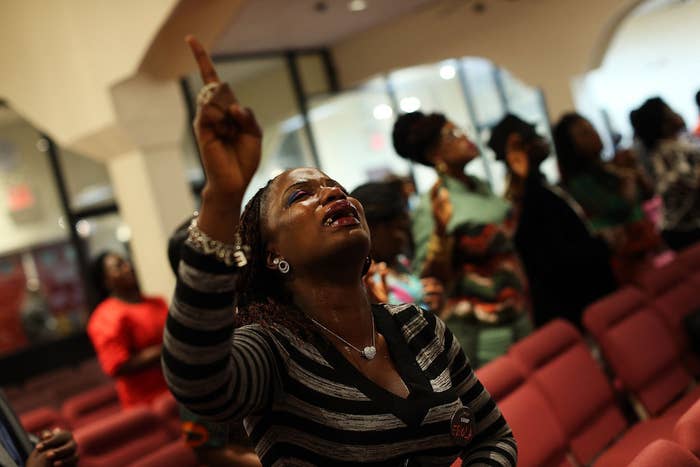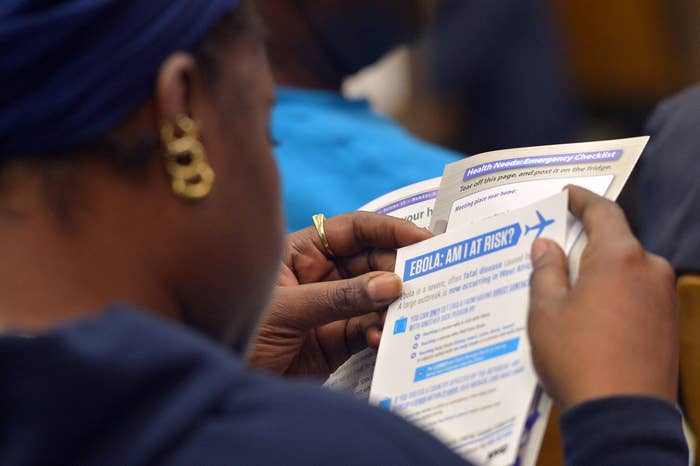
STATEN ISLAND, New York — In the biggest Liberian community outside of Liberia, the trauma of the civil wars of the '80s and '90s is being dredged up again, this time by the deadly outbreak of Ebola that has killed 2,500 people in the West African country.
Some who lived through it tell Oretha Bestman-Yates, president of the Staten Island Liberian Community Association, that Ebola is worse than war. "Because with the civil war, you can tell your family: Run to Ghana, or run to Nigeria, or run to the Ivory Coast," Bestman-Yates, told BuzzFeed News. "You could know where the rebels are coming from, and you could run the other way. With Ebola, you don't know."
Staten Island is home to some 10,000 people of Liberian descent. Born of the two civil wars that ravaged the West African country for more than a decade, killing hundreds of thousands of people, Little Liberia is in many ways a community of refugees. According to one survey by African Refuge, a social services group, 68% of Liberians in the enclave said they'd had at least one family member killed in the wars.
Community leaders in Little Liberia fear that deep-rooted trauma of war is being compounded by the trauma of disease — not only the loss of relatives to Ebola but the confusion, anxiety, and stigma that the epidemic has brought to stateside Liberians.
A network of social service organizations cropped up in Staten Island in the 1990s to help resettle refugees and deal with the various problems that afflicted them. By and large, that infrastructure has faded along with its funding in the years since the wars. Now the task of caring for residents is falling to a community that feels increasingly unprepared to deal with the unfolding tragedy.
"To know that everybody is gone," said Naomi Saywrayne, who has lost 15 members of her family to Ebola, "it's unimaginable. It's something we cannot put into words."
Saywrayne had been planning to go back home earlier in the year. Then the outbreak hit.
"I wasn't [in Liberia] when the war started," Saywrayne said. But her mother and sisters, who are now in Staten Island, were. "And now this? It's too much."

A family in the congregation of Laurenzo Stevens, the pastor of New Life Church, lost three relatives to Ebola in quick succession. By itself the grief is immense, but added to it is the pounding anxiety of the aftermath: The three deceased were the remaining adults in the household in Monrovia. Now the only ones left there are two girls, 8 and 10 years old, and a 14-year-old cousin to care for them.
"Everybody now is afraid to go to the house," Stevens told BuzzFeed News. "Even though the quarantine is over now, still nobody wants to go there."
The church has helped the family send food and supplies to the children, and the congregation, Stevens said, continues to pray for them. This is how many of the families in Little Liberia are dealing with the ongoing consequences of the outbreak: through pastors and other community leaders, and with the help of friends and surviving family.
Little Liberia is tiny and close-knit. The majority of Liberians and Liberian Americans here live in the same federally subsidized housing development, a row of brutalist brick buildings along Park Hill Avenue.
The enclave's close quarters also harbor transplanted versions of the fractiousness that plagued civil-war Liberia and that displaced many of these residents to New York in the first place; local political rivalries are often reflective of the conflicts back home. The civil wars had multiple, complex fault lines, but mostly they pitted indigenous Liberians against so-called Americo-Liberians — the descendants of the freed American slaves who were the country's founders and historically kept a tight grip on power.
War trauma has been a central aspect of the Little Liberian experience. Stories about watching the torture and murder of family members, or about being conscripted to participate in horrific acts, are not atypical.
"People here are still traumatized by the civil war," said Bestman-Yates. "You have people here, a bottle falls and breaks and they try to take cover, because it reminds them."
Liberians fleeing the civil wars began flocking to Staten Island in large numbers in the 1990s. To help their transition, a number of organizations devoted to refugee resettlement coalesced in the area, many of them at least partly devoted to the task of providing psychological counseling to victims of the violence.
Among the most durable of these groups is African Refuge, a community organization tucked into a basement in the housing complex on Park Hill Avenue. African Refuge grew out of a program to provide counseling to trauma victims by the Mailman School of Public Health at Columbia University. It then turned into an independent organization providing all manner of health and resettlement services to the residents of Little Liberia.
Judy L. Brown, African Refuge's executive director, said that the center's clients were increasingly showing strains caused by the Ebola epidemic. There are fears that the disease will find its way to Staten Island, for example, and there is the growing experience of stigma and suspicion from hospital workers, employers, and non-African neighbors.
As for mental health counseling: "We do it daily through our case management, through our nursing program," said Brown. "But we are not funded at this point to provide mental health or psychological counseling, or any type of ongoing counseling."
This is not to say that clinical social workers or mental health counselors alone would be a panacea for the multilayered distress of Little Liberia. Several community leaders told BuzzFeed News that there are many problems with applying a conventionally Western approach to mental health to a culture that, although on New York's shores, remains decidedly West African.
"In our community, our counselors are our elders, our mothers and fathers and uncles and aunts," said Togba Porte, who is coordinating the New York West African community's response to the Ebola crisis. "And they are our religious leaders, be they Christian, be they African traditional leaders, be they Muslim leaders."
"We are saying that training should be given to Africans themselves, who speak the language of the community, who sympathize with the culture, to be able counsel these families," Porte added. "We should be part of that counseling team."
This, although to a minimal extent, is already happening. Solomon B. Reeves is a social worker who worked for Lutheran Social Services during the days of refugee resettlement as a caseworker in Little Liberia. Although the formal period of resettlement has gone, along with its funding, Reeves said he still follows up regularly with the refugees he used to work with. "I'm doing it because most of us come from Liberia," he said. "I do it because they still need help."
Some of these refugees, Reeves said, are experiencing renewed pain from the Ebola epidemic. "Ebola has opened the old wounds and created new ones," he said.
"These are people who went through 14 years of civil war. They managed, by the grace of God, to spare their lives. To build their lives from scratch," Reeves said. "And then for Ebola to reopen that wound — it's not going away any time soon. It is something that's going to be in the minds of those victims forever."
